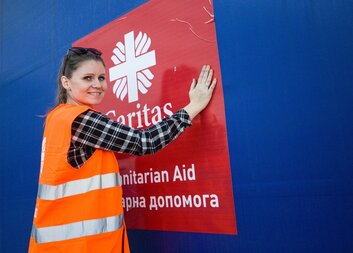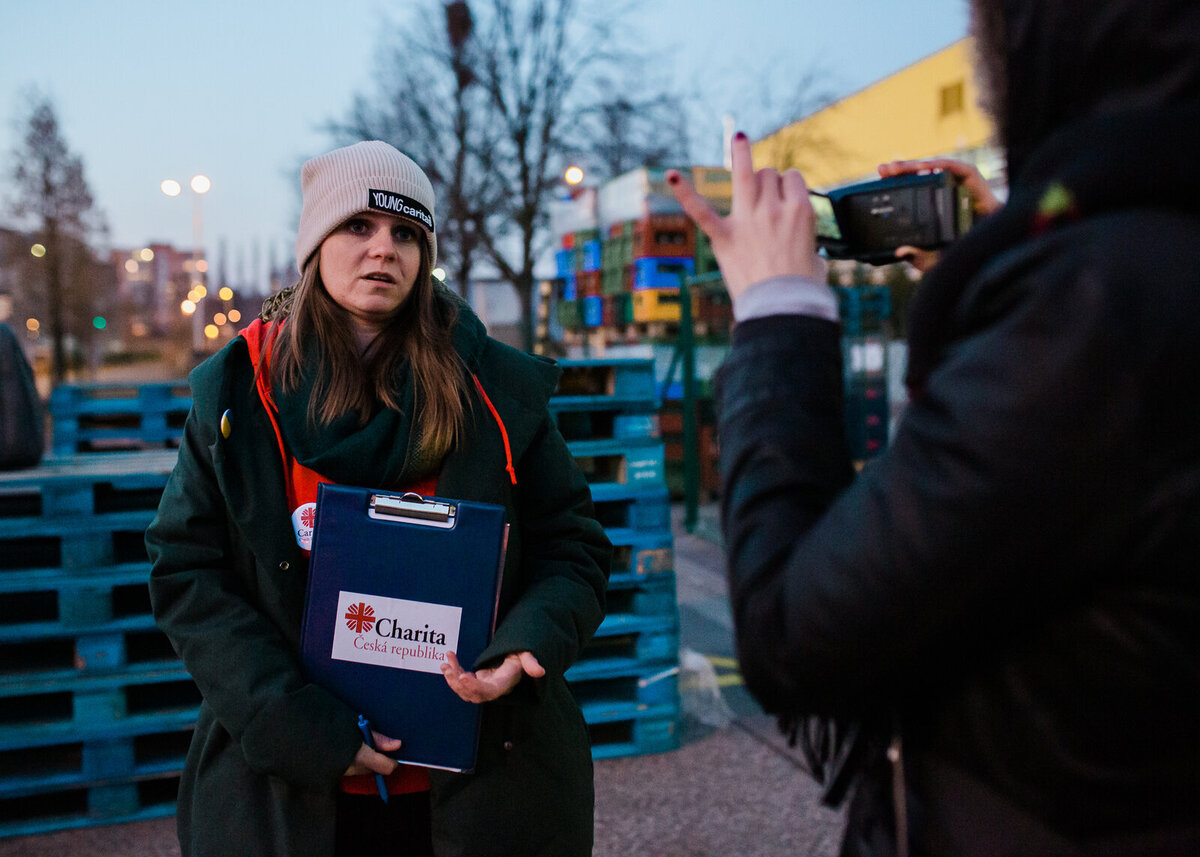The invasion of Ukraine by Russian troops has brought the need to provide humanitarian aid to millions of people fleeing the war in the country. At Caritas, we had to start delivering material aid to the war-torn country almost overnight. And we did this with almost no previous experience. Thanks to the unprecedented help, and dedication of our colleagues, we have succeeded. How does a global development education manager become a logistics coordinator overnight? Read the interview with Šárka Prošková, who has gone through this transformation.
Caritas Czech Republic does not normally send trucks with humanitarian aid abroad. But it took only a few days and the first two trucks headed to Ukraine. What was it like to manage these logistics in just a few days?
It was challenging, but there was this urgent need and we had to respond and adapt to it. We dispatched - and more importantly filled - the first two trucks in a day and a half.
I normally work in development education and outreach, so coordination, basic logistics and dealing with suppliers are close to my heart. At the same time, I have no problem communicating with partners, negotiating discounts etc.. This helped me a lot in the beginning. Of course, it is completely different, but on the other hand, I was already doing something similar in principle before the outbreak of the war in Ukraine.
So it is basically just a different type of coordination.
Exactly. But what was completely new for me, was the logistics. Bulk logistics. I had no experience with that before. My colleagues and I had to learn, for example, what kind of goods we can send in a truck, how to stack them, what weight it needs to be, what are the dimensions of various pallets so that we can store and then ship the goods in the trucks..... It is a very specific discipline. I am not surprised that people study this in college. In practice, I guess you can learn it pretty quickly, at least the basics, but it was quite a shock in the beginning.
Sounds like a lot of stuff to cover to get a truck going. And with no prior experience, it seems like something almost impossible.
If we did not have the support of the internet, colleagues and friends who have experience with this type of logistics, first humanitarian tranport certainly would not have taken off so quickly. But by consulting with various experts and with the help of the supplier, which was Makro, we made it. All that went to the wholesaler from our side was a general specification of what type of goods we required, and Makro set everything up so that the first two trucks were filled. What's more, they even donated all the goods in the end. But other companies helped us as well. For example, DSV Solutions not only provide us with free storage space, but they also take care of warehouse management, transport around Prague, or even find affordable pallets for us. There is a huge shortage of them right now.
So do you feel that everyone is helping as much as they can?
Absolutely. We have experienced a huge wave of support. We have received countless valuable advice on what to look out for. And that continues to be the case. Companies help us with IT solutions, copywriting, etc.
Large amounts of humanitarian aid are going to Ukraine. Not only from Caritas but also from other organizations. How difficult is it to get such a quantity of goods in a relatively short time?
This is a whole other specific discipline. In companies, so-called buyers specialize in this. At Caritas, that is my main role at the moment. I write to the suppliers what we need and in what quantities, plus the size, height and weight of the pallets we can ship. We then get the specific logistics data directly from the suppliers. How much of a particular item can fit on a given pallet and, of course, what the price is.
But the truth is that the amount of help being sent is large and there is already a shortage of certain types of goods on the market. For example, baby nappies, baby hygiene, nutrition or even canned food. We have to search intensively for all these things.
Has it ever happened to you that you simply could not find the goods you needed?
Fortunately, we have managed to establish cooperation with a Czech family company, Ratio, which is now providing this for us. All we have to do is send what we need, for example ten pallets of pasta and five pallets of canned meat, and they will arrange the goods with the suppliers, usually at a very good price.
I imagine that many companies are donating goods for free as part of their aid to Ukraine.
This was certainly the case in the beginning, but it is not a sustainable mode, because the volumes we are talking about are truly enormous. However, it is true that we are still getting a number of goods either free or at a big discount.
For example, Mattoni has released water bottles originally prepared for the Russian market and we are now not only sending them to Ukraine, but Mattoni is also supplying our refugee aid centres in the Czech Republic. Náchod Hospital donated two incubators to Ukraine. But the list of those who help us is much longer. At the same time, many companies do not even want their involvement in aid to be mentioned.
What are the most needed items of material humanitarian aid in Ukraine?
These are mainly non-perishable foods, hygiene items, baby items such as diapers and baby food, sleeping items such as beds, mattresses, blankets, but also generators, field kitchens and medical supplies.
Does Caritas have a collection point where people can take these things?
Caritas responds directly to the specific needs of our local partners on the ground. So we deliver directly in bulk, by the pallet. Therefore, we cannot accept individual material donations. It would significantly reduce the effectiveness of the aid and would be logistically very challenging. But we certainly appreciate it very much if people want to help us help Ukraine. What will certainly help us is financial contributions to our public appeal in support of Ukraine. Thanks to it, we are able to continue delivering aid to the country.
Thank you to all of you who help with us!
Interested in more interviews like this? Read more:
- Financial aid for Ukraine is what we value most at the moment, says Klára Boumová
- Volunteering opens new doors for us, says Adéla Procházková
- Behind the scenes of Caritas Czech Republic: Meet our Senior Livelihoods Advisor, George Jend








